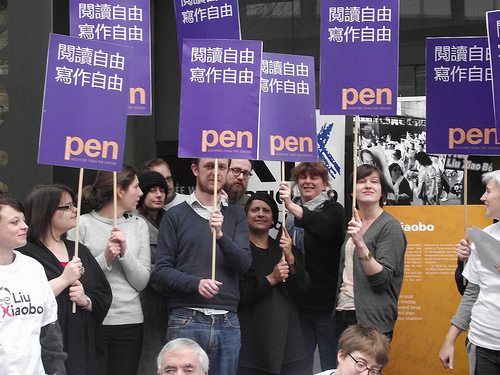Mo Yan's Nobel Prize Win Draws Attention To Chinese Censorship

Mo's win suggests mixed messages in a time when the international community has been embracing outspoken dissidents from China such as Ai Weiwei and Chen Guangcheng.
Critics speculate that the award, while not unjustified, may have been the Norwegian Nobel Committee's attempt to appease the Chinese government after the 2010 incident with Liu Xiaobo.
Just two years ago, the writer was named the first Chinese winner of the Nobel Peace Prize, a recognition that outraged the national government to such a degree that it affected foreign relations.
Liu was jailed in 2008 on "subversion charges." He gained notoriety for his leadership role in drafting the manifesto known as Charter 08, calling for legal reform and a multi-party government.
Incensed by the commendation, the Chinese government took to removing all news of the award from state-run media. They condemned the award as a "desecration" and a deliberate snub, even delaying shipments of Norwegian salmon to the country for so long that the fish would rot before clearing customs. Liu, who remained in jail during the presentation of the award, was not allowed to send any family members to represent him at the ceremony. He was instead represented by an empty chair.
Mo Yan, whose writing earned praise from the Nobel Committee as "hallucinatory realism [that] merges folk tales, history and the contemporary," told a reporter that he's not sure if he's happy about winning the prize.
In an interview with China Central Television (CCTV), he said, "Happiness means a healthy body and a total absence of mental burdens, but now I'm under high pressure and bothered by worries. Can I say that I'm happy?
"But if I say I'm not happy, people will consider that I'm striking a pose. How could you be unhappy after winning the Nobel Prize?"
Since receiving the award, the writer has been swept in a whirlwind of national celebration, with Chinese leader Li Changchun sending his personal congratulations in an open letter to the Chinese Writers' Association, of which Mo is vice president. Mo has been exalted, like other Nobel laureates before him, as a national hero.
After the Committee's announcement, Mo held a press conference calling for the release of Liu Xiaobo, telling reporters, "I hope he can achieve his freedom as soon as possible." It appears that now that the writer has such a universally appreciated voice, the silence from "not talking" could be close to over.
Executive secretary of the independent Chinese Pen Center Patrick Poon told CNN that's exactly what he should be doing. "He should have this responsibility," he said.
Another story of a suppressed Chinese writer came in 2010 in the form of Murong Xuecun, another best-selling novelist. Having won a literary prize in China, he brought to the ceremony in Beijing an acceptance speech containing "the most incendiary" - and probably the most honest - writing he'd ever produced.
"Chinese writing exhibits symptoms of a mental disorder,” he had written. “This is castrated writing. I am a proactive eunuch, I castrate myself even before the surgeon raises his scalpel.”
Predictably, the ceremony organizers forbade him to deliver the speech. So Murong instead went onstage, made a zipping motion across his mouth, and left. Afterward, he posted the entire heartwrenching speech on the Internet, detailing the self-loathing and fury he had felt as an artist. This was something he had done before with three of his other novels and some said it pointed to a pressure he felt in conforming to government ideals.
"There are journalists here, and perhaps some others, who may report later that I have delivered a rather angry speech. Well, I am not angry; I am just describing my situation, because I believe it is certainly not just my situation, but the situation faced by all of China’s writers," he had written."I am a writer. It is difficult to call myself a writer, even when I stand at a podium to receive a prize, I feel uncomfortable calling myself a writer—I am merely a word criminal."
"Some people would say that this is just the way things are. My feeling is that I am already close to suffocation. I struggled to choose safe words in a linguistic minefield. It seems that every single Chinese word looks suspicious. I want to say that this not only harms my works, it also harms our language."
Reach Assistant News Editor Michelle Toh here.



